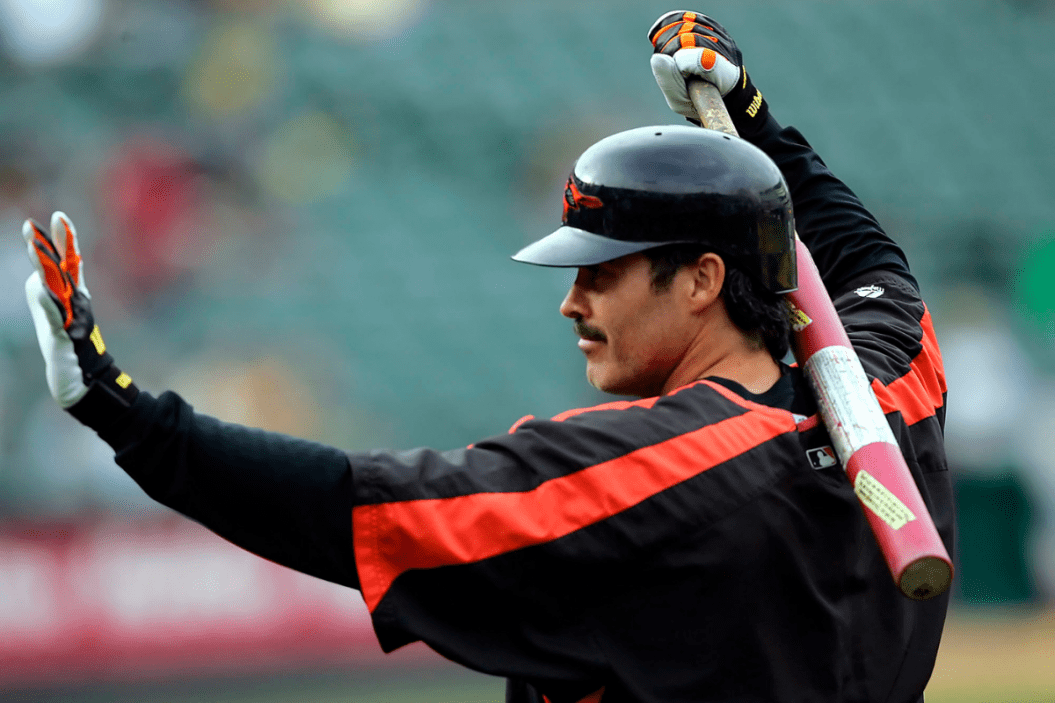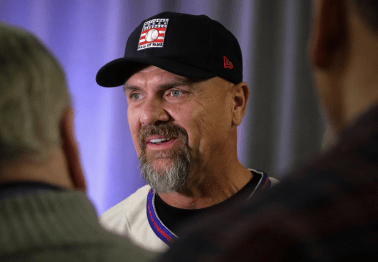When the scandals surrounding steroid use began to overtake baseball, speculation began on which players it might keep out of the Baseball Hall of Fame.
These days, it's become clear that the MLB players tarnished with the steroid brush aren't likely to become Hall of Famers. Home run king (deal with it) Barry Bonds and one of the five best pitchers of the modern era, Roger Clemens, seem unlikely to make the cut, which leaves basically no hope for anybody.
One of the first guys to get mentioned as a potential Hall of Fame casualty was Rafael Palmeiro. Indeed, despite a great career, the Hall shut its doors to Palmeiro. And yet, the Major League Baseball star kept at it as a baseball player long after the sport of baseball had turned its back on him.
Then, his kids played the sport he starred at.
Early Life and Career
Mississippi State's Will Clark and Rafael Palmeiro at the 1985 College World Series: pic.twitter.com/QBOidDKa
— SI Vault (@si_vault) December 13, 2012
RELATED: Ivan "Pudge" Rodriguez is a Catching Legend, But Where is He Now?
Palmeiro was actually born in Cuba, but he came to the United States and played high school ball in Miami, Florida. He was drafted by the New York Mets in the eighth round out of high school but instead decided to go to college to play ball at Mississippi State University.
Palmeiro mashed for the Bulldogs, once winning the SEC triple crown by leading the conference in home runs, RBIs and batting average. He was drafted with the 22nd pick of the first round in the 1985 MLB Draft by the Chicago Cubs.
Outside of a cup of coffee with the Cubs in 1986, Palmeiro was primarily down in the minor leagues until 1987. The Cuban's first full season was in 1988, and he managed to make the All-Star team for the National League that year.
Despite this fact, Palmeiro was part of a considerable trade in the 1988 season between the Cubs and the Texas Rangers. Now in the American League, Palmeiro had a chance to get in the lineup as the designated hitter. However, he was also a first baseman.
Palmeiro proved to be a weapon with a bat in his hand, leading the AL in hits in 1990 and leading the majors in doubles in 1991, when he made his second MLB All-Star Game. The slugger became a free agent after the 1993 season and took a five-year deal worth $30 million to join the Baltimore Orioles. It took until the 1998 season for him to return to the All-Star Game, but he also won his second Gold Glove in a row and won his first Silver Slugger.
After that year, Palmeiro became a free agent once again. This time, he reversed course from his previous free agency experience. He returned to the Rangers on a five-year deal. Palmeiro had a fantastic campaign upon returning to Texas, posting personal bests in on-base percentage (.420) and slugging percentage (.630). He won the Silver Slugger and finished fifth in the MVP voting, his highest-ever finish.
Palmeiro also won a Gold Glove in 1999, but it's the most controversial Gold Glove we can think of. He won at first base even though he played all of 28 games at the position in 1999. Meanwhile, he played 128 games as a DH. Fortunately, Gold Glove voting is handled differently now than it was then.
The slugger then returned to Baltimore, saying he hoped to enter the Hall of Fame as an Oriole. In 2005, the 40-year-old was closing in on 3,000 career hits. He picked it up but was then also suspended for testing positive for steroids. Palmeiro threw his teammate Miguel Tejada under the bus, saying Tejada had given him a tainted B-12 shot.
After this, Palmeiro was persona non grata around Orioles Park. Fans either didn't like him for his steroid use, didn't like him for his treatment of Tejada, or both. This would be Palmeiro's final MLB season.
Rafael Palmeiro Steroids
Today in 2005, Rafael Palmeiro was suspended ten games by the MLB for violating the steroid policy- previously denying the allegations in front of congress. #TodayInSports pic.twitter.com/SYRUreztT5
— TodayInSports Co. (@TodayInSportsCo) August 1, 2018
Palmeiro is one of only six players with 3,000 career hits and 500 career home runs. More notoriously, his 2,831 games played are the most by any MLB player not to play in a World Series. He was also a four-time All-Star, a three-time Gold Glover and a three-time Silver Slugger.
Then, there are the steroids. That suspension in August of 2005 was not Palmeiro's first brush. Jose Canseco had named Palmeiro in his salacious tell-all book "Juiced." In March of that year, he was one of the players to testify in front of Congress about steroids in baseball. There, the slugger (who sat next to Mark McGwire) famously said, "Let me start by telling you this: I have never used steroids, period. I don't know how to say it any more clearly than that. Never."
Later that year, he tested positive.
Palmeiro's name also came up in The Mitchell Report and Jason Grimsley's affidavit about drug use in MLB. His name is now associated with the likes of Mark McGwire and Sammy Sosa as PED users. However, Palmeiro was perhaps dinged the most because of his adamant denial that day in front of Congress.
Rafael Palmeiro Now
While Palmeiro was dropped from the Hall of Fame ballot in 2014 due to a lack of support, he wasn't done with professional baseball. In 2015, Palmeiro signed a deal to play with the independent league's Sugar Land Skeeters, which became a Houston Astros affiliate in 2021. He only signed to play in one game, though, to play alongside his son Patrick.
Then, in 2018, Rafael and Patrick joined an independent league team called the Cleburne Railroaders. The elder Palmeiro was actually talking about making a comeback to MLB. He managed to hit .301 in limited at-bats. Unfortunately for him, the injuries that limited those at-bats got him and Patrick—who was evidently just along for the ride—released by the Railroaders.
Palmeiro has another son, Preston, who is currently in the minors with the Los Angeles Angels. He was a seventh-round pick in 2016 by the Angles out of NC State and his a career-high 17 home runs in 2018.
The numbers make it clear: Rafael Palmeiro was a great player, even with that dubious Gold Glove. If you visit a site like Baseball-Reference, you see that he put up Hall-of-Fame numbers. He'll just never get in the Hall of Fame.
Palmeiro's claim to fame is playing all those games and never making a World Series. In fact, he's not even the most successful, most-polarizing member of the 500-homer, 3,000-hit club. Alex Rodriguez also achieved that.

